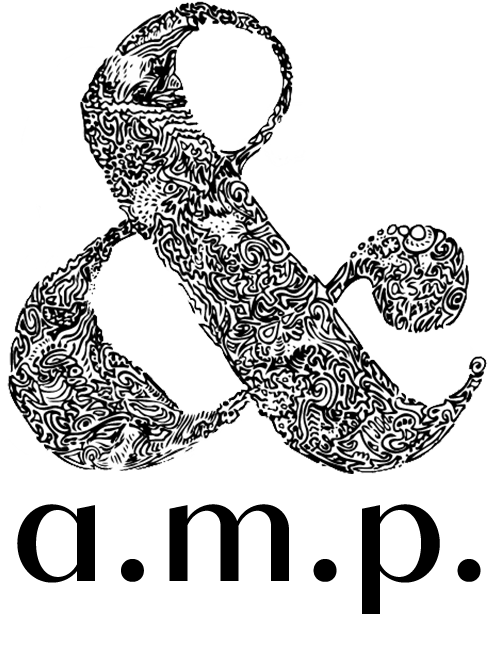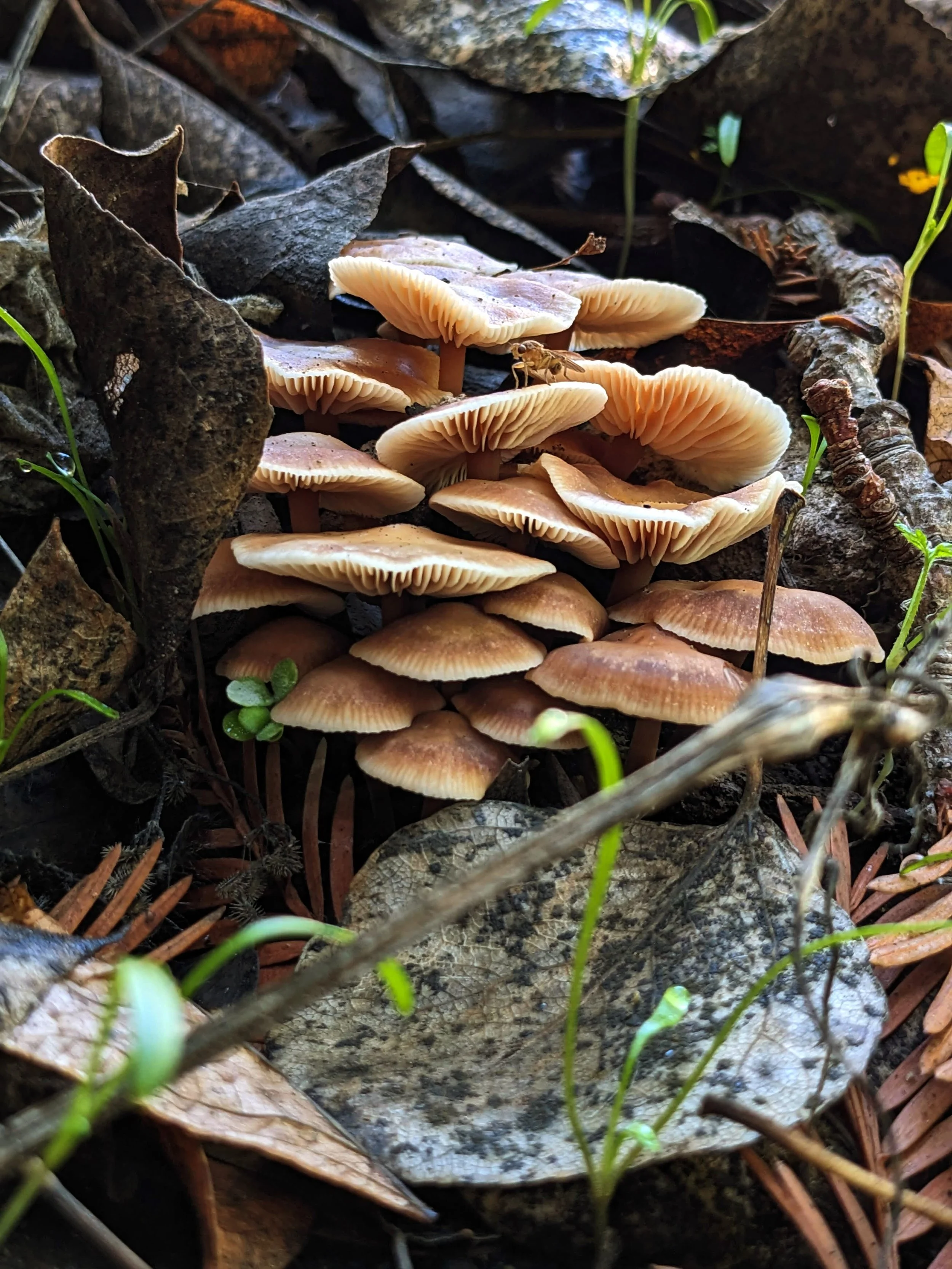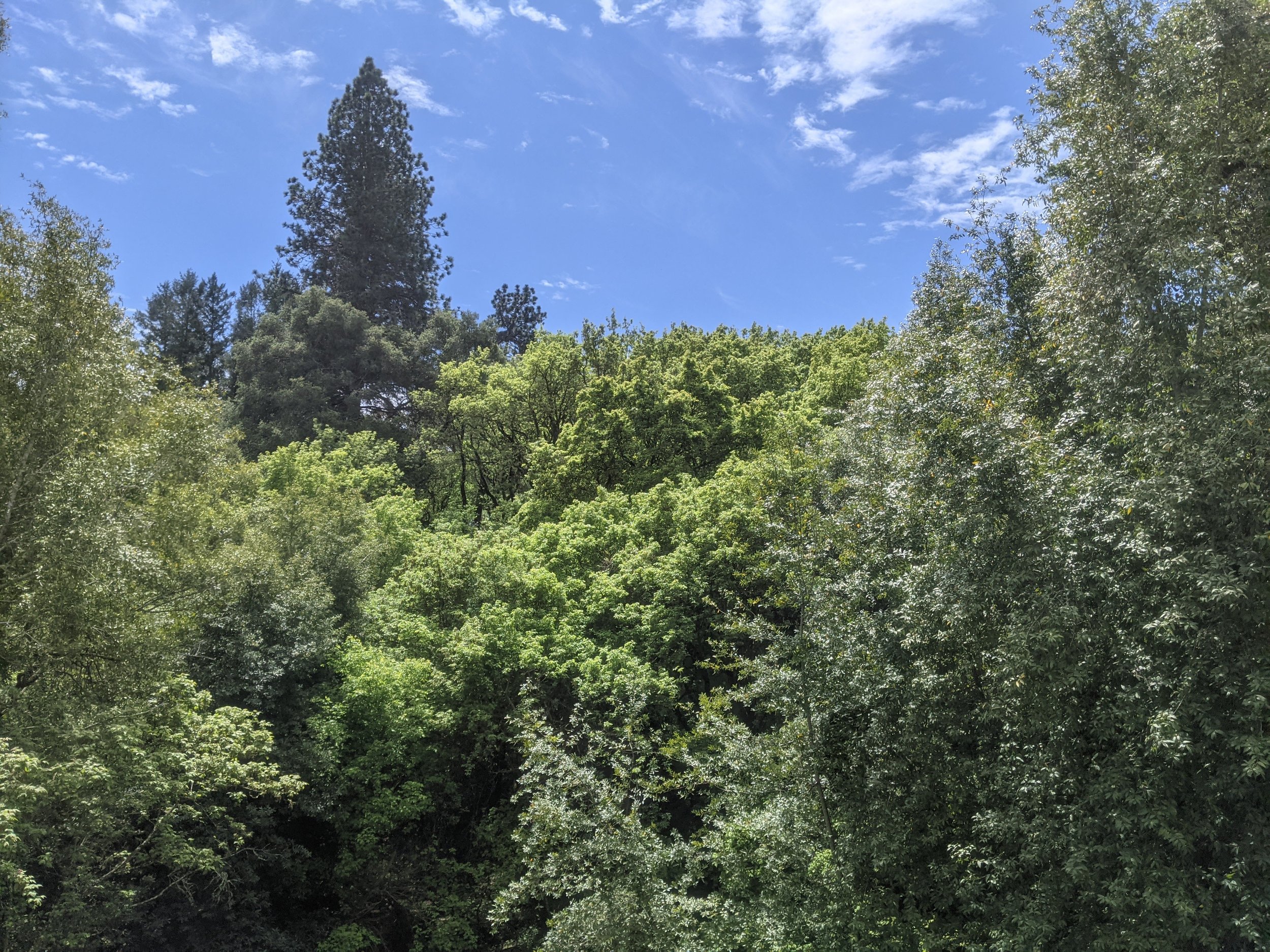Winter 2023
Growing up in the Chicago area I learned to hate winter. It began in October and lasted through April, sometimes into May. It brought brutal winds, temps low enough to close school, but never the soft, fluffy flakes to make an actual snow day. Winters in Chicago are mean, like a wicked step parent, and I reacted to them accordingly - half defiant thousand-yard-stare, "you can't hurt me,"; half whimpering under blankets dreaming spiteful revenge.
In 2010 I moved to California and began to learn new seasons. I learned to rejoice in clouds in the sky, a sign of "weather" to break up the enormous unending blue. I learned to pray for rain. "We only have summer and fall," I said to folks back home, "and fall lasts all winter long." Trees stay green or drop slick yellow leaves onto warm russet redwood duff. Air sparkles with evaporating dew. I bundle in sweaters and throws and then peel them off by lunchtime in the ever-warm solar noon.
Winter (now) in the woods (here) is mushroom time. The harvest is unending and voluminous. Bouquets arrive in morning bunches and then spend weeks relaxing into fragrant goo. It's likely not possible for one human person to know all their names and shapes. So many arrive and disappear again unrecorded, unrecognized. To me, each fruit is an orchard. I want to spend days wandering between their frilly gills and dusting my hair with their spores. To the mushrooms I give thanks. Thank you for teaching me about Gentle Winter. Giving Winter. Fertile Winter. Winter of Calm Air and Soft Dark Soil.
Spring-Summer 2023
I’m in a charmed sleep. A curse. But inside it I still dream, and in my dreams I live. I fuck strangers. I tackle obstacles. I am on a journey in my dreams: agile, voracious. Isn’t that nice?
I used to run every day. I used to dance for fun and for work. I used to lead other people in activities that make me nauseous to think of now. I don’t know how this body has always been so heavy and I only noticed it now. My body doesn’t have a wish, now. I’m not sure it wants to be well, yet. This rest is so fucking necessary. I hate that it took a global pandemic’s virus to make me stop trying to be a speeding train. I was never a speeding train, just a fragile animal, shivering.
Everything is fine as long as I don’t try to do anything I used to do to keep me happy.
I am still hurting from the way I used to live. I don’t yet have the nerve(s) to understand how I’m hurting now.
This post is woefully late, as is everything in my phenology.
September 3rd, 2022 I came down with a flu-like illness. I have not yet recovered. At first I thought it was heat exhaustion. Then, due to a mysterious infected bite on my leg, Lyme. Then, I was sure it was Myalgic Encephalomyelitis (aka chronic fatigue syndrome), or Long Covid, or one wearing the others’ name. Symptomatically, I am hounded by a fatigue which makes daily tasks feel like ordeals of strength and endurance. No matter how much I sleep - and, now, I sleep a lot - I am always exhausted. On bad days I have all-over body aches, headache, sensitivity to sound, and can barley keep my eyes open. On good days I want to take a walk to the end of the block. Sometimes I even do. Then I recover on the couch for an hour. The passage above was written in a gathering of my dear friends, and writing luminaries, Anya Pearson and Ella deCastro Baron in one of their To Exist is to Flare workshops. If you live with chronic anything, do some crucial self-care and join one of their next offerings.
Summer 2022
I live in a tree canopy.
I live in a forest canopy. Oak, Bay Laurel, Fir, Poplar, Maple, Redwood are my neighbors. I look up to them. I am learning to listen to them, and all their society; Deer Mushrooms, Cramp Balls, Hairy Bracket, Alligator Lizard, Salamander, Garden Snake, Wood Spider, worm, beetle, burrowing bee crawling among Woodland Strawberry, Miner’s Lettuce, Western Lady Fern, Poison Oak, Trillium, Solomon’s Plume, Broad-leaf Forget-Me-Not. Some, like me, are travelers, colonizers. Some have family which stretch back right here all the way until Earth made them. Where I live now is near a street called Zayante. Sayanta is also the name of a Tamien village where dialects of Tamien and Awaswas were spoken for millennia before the Spanish, before the missions, the Mexican ranchos, the Anglo industrialists and railroad barons came here to scrape lumber and futures off the face of these sandstone ridges. I live on Tamien land. The people who belong to this land where I sit and work are still here having survived centuries of genocide and enslavement and persecution. They are still here, but the rent is too damn high and so many live 50, 100 miles inland from the coast. But my ancestors were those same industrialists and colonizers. Their wickedness and greed have placed me in a class of people who can live in this luxury: green earth, spring creek, hummingbird’s nest. I live on someone else’s homeland. I couldn’t point to my own on a map. After centuries of running, hiding, domination and theft, my people don’t tell the story of where we come from anymore, if we ever did. I don’t know if my grandfather spoke Scots, or understood Gaelic. I don’t know if my great-great-grandmother carried moors and dales in her bones which rhymed with the Mni Sota lakes she settled beside. I know that I was taught not to carry their stories with me; I was taught to forget them. So my re-learning curve is as steep as this mountain drop to the creek below. I have no one to learn from but the trees.
Right now, from the trees, I’m learning about time. In Spring I watch the rosy mist of new Maple buds churn to lime-lemon froth. Next, they turn vivid kelly green, wide and splashed with sun. The season of leaves is round and regular, changing and returning. I also see Oak and Bay shoots sprout overnight from stumps long severed. I’ve been taught that the present is all we have. But the shape of the Oak Stump-Sprout contains past and future, with the contours of the present cut out.
Sometimes I think everything has always been just like this and it never changes. Sometimes I feel a great newness unfolding, enfolding around me. Or maybe all the time I know both things. I can’t say it well enough. But the trees know what I mean.






